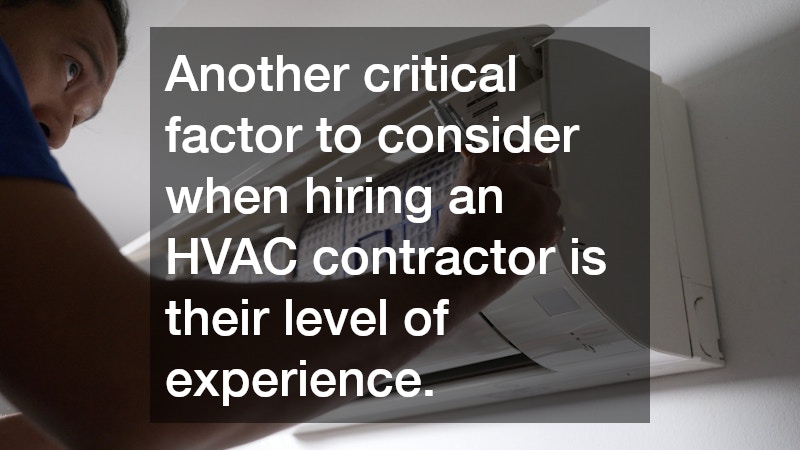
When searching for an HVAC contractor, the first quality that should be at the top of your list is certification and training. These credentials demonstrate that the contractor has gone through the necessary education and received a formal acknowledgment of their skills. A certified HVAC contractor is more likely to be up-to-date with the latest techniques and technologies critical to modern heating, ventilation, and air conditioning systems.
Moreover, many certifications require continuing education, meaning that certified contractors are committed to ongoing professional development. This commitment ensures that they stay current with changes in building codes, energy efficiency standards, and technological advancements.
By choosing a certified professional, you also reduce the risk of poor workmanship, which can lead to expensive repairs and inefficiencies down the line.
Beyond the basic certification, some HVAC contractors pursue additional specialized training in areas such as geothermal or solar technology. This additional knowledge can be especially useful if you are looking to integrate more advanced systems into your home. Hence, verifying the certifications and specialized training of an HVAC contractor offers invaluable peace of mind and a high probability of receiving top-notch service.
Experience
Another critical factor to consider when hiring an HVAC contractor is their level of experience. While newly certified contractors might bring modern techniques and innovative ideas to the table, there is no substitute for years of hands-on experience. Experienced contractors have encountered a wide variety of systems and can often diagnose issues more quickly and accurately than their less-seasoned counterparts.
Having dealt with numerous systems over the years, a seasoned HVAC contractor also develops a keen sense for potential problem areas that might not be immediately obvious. This depth of understanding can save both time and money by addressing issues before they turn into larger, more costly problems. Additionally, such professionals are typically more adept at recommending systems tailored specifically to meet the unique demands of your home or business environment.
It’s also worth noting that experienced contractors likely have a well-established reputation within the community. They are more likely to be familiar with area-specific needs and regulations and have built a network of relationships with local suppliers and professionals. Checking reviews or asking for references can provide invaluable insights into the kind of experience you can expect from a particular contractor.
Reputation and References
The reputation of an HVAC contractor is another key consideration that should heavily influence your decision-making process. Reputation can give you a general idea of the contractor’s reliability, professionalism, and skill level. Online platforms like Yelp and Google Reviews offer a trove of information from past customers that can help you gauge the quality of service you might receive.
Word-of-mouth remains a powerful tool; recommendations from friends, family, or colleagues can provide personal insights that online reviews might not capture. Reputable contractors are often consistent in their service quality, making them a safer choice for your HVAC needs. They are also more inclined to resolve issues swiftly and satisfactorily to maintain their standing in the community.
Aside from online reviews and personal recommendations, don’t hesitate to ask potential contractors for references. A reputable HVAC contractor will gladly provide you with references from previous clients. Contacting these references can offer you firsthand testimonials of what it’s like to work with the contractor, providing another layer of assurance in your decision-making process.
Licensing and Insurance
Licensing and insurance should be non-negotiable factors when selecting an HVAC contractor. Holding a valid license indicates that the contractor has met state and local requirements, including examinations and code compliance. A license serves as a testament to a contractor’s credibility and competency in delivering heating and cooling services.
Insurance is equally crucial because it protects both you and the contractor in case of accidents or property damage during the project. Comprehensive insurance often covers workers’ compensation and liability, safeguarding you from potential legal or financial trouble. Before any work begins, ask to see proof of insurance and verify that it is current and sufficient for the scope of your project.
Be wary of contractors who are unwilling to provide proof of licensing or insurance promptly. Such reluctance could signal a lack of professionalism and expose you to unnecessary risks. Remember, reputable contractors will always be transparent about their licensing and insurance, as they understand the value of establishing trust with their clients.
Communication Skills
Effective communication is an often-overlooked but essential quality in an HVAC contractor. Clear, timely communication ensures that your project progresses smoothly and that you are kept in the loop throughout the process. From initial consultations to post-installation follow-ups, effective communicators ease the uncertainty and stress that can come with HVAC projects.
Good communicators take the time to listen to your concerns, provide detailed explanations, and answer all of your questions comprehensively. A contractor who prioritizes communication also establishes reasonable expectations and timelines, mitigating any misunderstandings that could derail the project. Additionally, they will keep you updated on budget adjustments or unexpected challenges that arise during the work.
During your initial interaction, pay attention to the contractor’s responsiveness and willingness to explain complicated technical details in layman’s terms. These traits indicate that the contractor values openness and transparency and demonstrates their commitment to providing a positive customer experience. Ultimately, a contractor with excellent communication skills will ensure a successful, stress-free collaboration.






